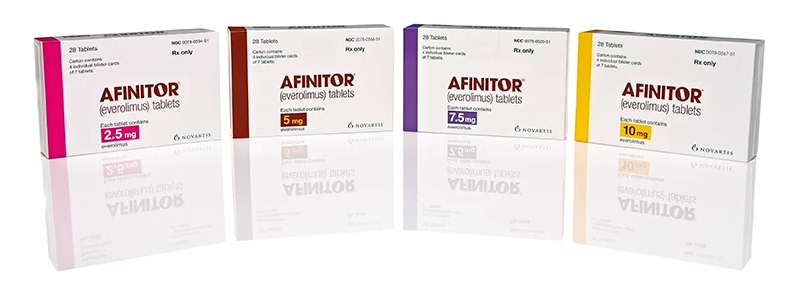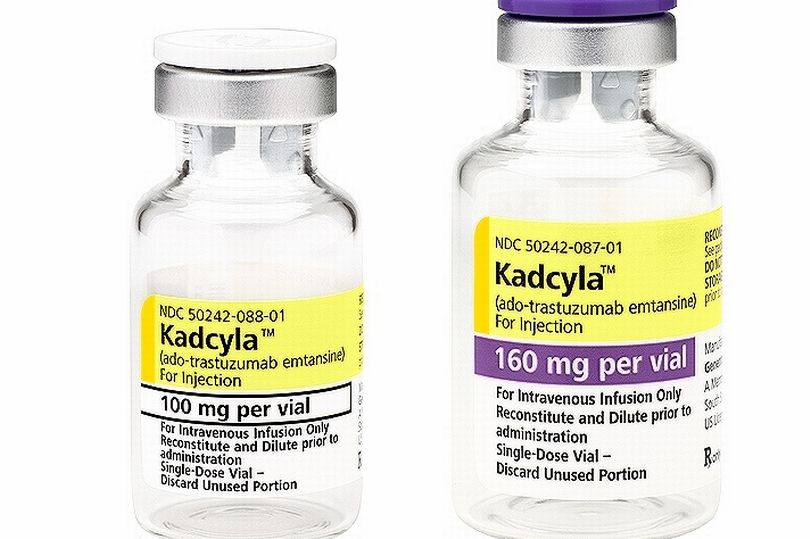Afinitor (everolimus) vs Kadcyla (trastuzumab emtansine)
Afinitor (everolimus) vs Kadcyla (trastuzumab emtansine)
Afinitor (everolimus) is an mTOR inhibitor used primarily to treat certain types of cancers such as advanced renal cell carcinoma, subependymal giant cell astrocytoma (SEGA), and hormone receptor-positive, HER2-negative breast cancer, among others. Kadcyla (trastuzumab emtansine) is an antibody-drug conjugate specifically designed to target HER2-positive breast cancers, combining the action of the monoclonal antibody trastuzumab with the cytotoxic agent emtansine. The choice between Afinitor and Kadcyla would largely depend on the specific type and molecular characteristics of the cancer being treated, with Afinitor being more broadly applicable to various cancers, while Kadcyla is specialized for HER2-positive breast cancer cases.
Difference between Afinitor and Kadcyla
| Metric | Afinitor (everolimus) | Kadcyla (trastuzumab emtansine) |
|---|---|---|
| Generic name | Everolimus | Trastuzumab emtansine |
| Indications | Advanced hormone receptor-positive, HER2-negative breast cancer, advanced neuroendocrine tumors, renal cell carcinoma, tuberous sclerosis complex-associated seizures, subependymal giant cell astrocytoma, and renal angiomyolipoma | HER2-positive metastatic breast cancer |
| Mechanism of action | mTOR inhibitor | Combines HER2 targeted action of trastuzumab with the cytotoxic activity of the emtansine moiety |
| Brand names | Afinitor, Zortress, Votubia | Kadcyla |
| Administrative route | Oral | Intravenous |
| Side effects | Mouth ulcers, infections, rash, fatigue, diarrhea, decreased appetite | Fatigue, nausea, musculoskeletal pain, hemorrhage, thrombocytopenia, headache |
| Contraindications | Hypersensitivity to everolimus or other rapamycin derivatives | Hypersensitivity to trastuzumab, emtansine, or any excipients |
| Drug class | Antineoplastic agent, mTOR kinase inhibitor | Antibody-drug conjugate, antineoplastic agent |
| Manufacturer | Novartis | Genentech (Roche) |
Efficacy
Efficacy of Afinitor (Everolimus) in Breast Cancer
Afinitor (everolimus) is a medication that has been shown to be effective in treating hormone receptor-positive, HER2-negative breast cancer in postmenopausal women. It is specifically used for patients who have already received certain other cancer treatments, such as letrozole or anastrozole. Everolimus works by inhibiting the mTOR pathway, which is a key regulator in tumor cell division, blood vessel growth, and cell metabolism. Clinical trials have demonstrated that when Afinitor is combined with exemestane, it significantly extends progression-free survival compared to exemestane alone. However, it is important to note that while Afinitor has been associated with an improvement in progression-free survival, an increase in overall survival has not been definitively established.
Patients treated with Afinitor may experience side effects, which can range from stomatitis, infections, rash, fatigue, and diarrhea to more severe conditions such as non-infectious pneumonitis and hyperglycemia. The risk of these side effects must be balanced against the benefits of the treatment, and patients should be monitored closely by their healthcare provider.
Efficacy of Kadcyla (Trastuzumab Emtansine) in Breast Cancer
Kadcyla (trastuzumab emtansine) is a targeted therapy used to treat HER2-positive metastatic breast cancer. It is typically administered to patients who have previously received trastuzumab and a taxane, separately or in combination. Kadcyla is a conjugate of the monoclonal antibody trastuzumab and the chemotherapy agent DM1 (emtansine), which allows for the direct delivery of the cytotoxic agent to the cancer cells that overexpress HER2. This targeted approach helps to minimize the impact on normal cells and reduces some of the side effects associated with traditional chemotherapy.
Clinical studies have shown that Kadcyla significantly improves both progression-free and overall survival in patients with HER2-positive metastatic breast cancer when compared to the standard therapy of lapatinib plus capecitabine. The treatment has been hailed as a significant advancement in the management of this aggressive form of breast cancer. Side effects of Kadcyla can include liver toxicity, heart toxicity, severe bleeding, and lung problems, among others. As with any cancer treatment, the potential benefits of Kadcyla must be weighed against the risks of adverse effects.
Regulatory Agency Approvals
Afinitor
-
European Medical Agency (EMA), European Union

-
Food and Drug Administration (FDA), USA

-
Health Canada

-
Pharmaceuticals and Medical Devices Agency (PMDA), Japan

-
Therapeutic Goods Administration (TGA), Australia

Kadcyla
-
European Medical Agency (EMA), European Union

-
Food and Drug Administration (FDA), USA

-
Health Canada

-
Therapeutic Goods Administration (TGA), Australia

-
Medsafe (NZ)

Access Afinitor or Kadcyla today
If Afinitor or Kadcyla are not approved or available in your country (e.g. due to supply issues), you can access them via Everyone.org.
How it works

Make an enquiry
Choose the medicine you want to buy, answer a couple of questions, and upload your prescription to speed things up. We’ll get back to you within 24 hours.


Make an enquiry
Choose the medicine you want to buy, answer a couple of questions, and upload your prescription to speed things up. We’ll get back to you within 24 hours.


Breeze through the paperwork
We'll guide you through the required documents for importing unapproved medicine, ensuring you have all the necessary information.


Get a personalized quote
We’ll prepare a quote for you, including medicine costs and any shipping, administrative, or import fees that may apply.


Receive your medicine
Accept the quote and we’ll handle the rest - sourcing and safely delivering your medicine.

Some text on this page has been automatically generated. Speak to your physician before you start a new treatment or medication.
Let's talk
If you have any questions, call us or send us a message through WhatsApp or email:
Contact us




